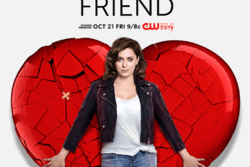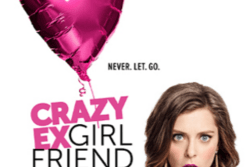Thankful for Crazy
“Did you watch it? Are you caught up?” These are very common questions to hear in the JWA office on Monday mornings, when we can all debrief the latest episode of Rachel Bloom and Aline Brosh McKenna’s hit (feminist, Jewish, wickedly smart, hilariously aware) television show/musical extravaganza, Crazy Ex-Girlfriend.
This season, though, the conversations aren't as focused on Rebecca’s love for Josh or the new incisive musical number that sums up another facet of women’s experience in America. There is, instead, an aura of worry as we watch our beloved Rebecca Bunch slip into the darker reality of what it means to be the “Crazy Ex-Girlfriend.” Our social media manager, Emily Cataneo, and I sat down to talk about what this show means to us, the power of representation, and how grateful we are for crazy done well.
(Spoilers ahead and TW for a discussion of suicide)
Bella: How are you feeling about this season, now that we are six episodes in?
Emily: I'm feeling great about it. I think the showrunners are getting to the heart of Rebecca Bunch and to all the issues that have been hinted at but never explicitly confronted in the earlier seasons.
Bella: Definitely. These issues that have always been looming: Rebecca's past, her mental health, the way she uses popular love narratives to explain her decision making, they are all coming to a head. Were you surprised by her suicide attempt?
Emily: No, I wasn't. Looking back, all the pieces were there. I had heard that this was a big episode, and given the direction the show has taken of late, I figured, what else could it be?
Bella: Were you worried about how the show would handle such a sensitive topic?
Emily: I was slightly concerned, but I shouldn't have been: Rachel Bloom and Aline Brosh McKenna get it. What did you think?
Bella: I thought the same thing actually! Once the show began to show this darker reality of living with a mental illness, I realized that the showrunners have really earned our trust when it comes to these topics, which feels like an especially huge thing to be able to say about a show when it comes to representations of mental illness.
Emily: For sure. I think it's especially important that this show, with this tone and theme and set of characters, is exploring these darker topics. This isn't some prestige drama about anti-heroes doing “Bad Man Things;” it's a rom-com send-up about a "quirky" woman. The fact that Bloom and Mckenna are willing to go there and delve into that "quirky" woman's very real mental health problems makes an important statement about how pervasive mental health problems are for so many people.
Bella: Absolutely! And, that there is a different set of expectations for women when it comes to mental health. Often, women don’t have the luxury of being the anti-hero; we are navigating issues of anxiety and depression while also worrying about how to “look hot for ourselves, but just for ourselves.” I appreciated that in this last episode, we saw the aftermath of her suicide attempt. What did you think of the ways the other characters responded to Rebecca's decision?
Emily: Their responses felt so real to me. In these mental health crisis situations, being the caretaker, being the friend, is incredibly hard too. And it can lead to a lot of misconceptions about mental illness, as demonstrated in Josh and Nathaniel's (initial) reactions. I loved how the show showed each of these characters' responses in ways that felt true to each of them and felt true as a whole.
Bella: I have to say that the longer Nathaniel is on the show, the more I appreciate him. Not to make this conversation about the love interests, but it was very powerful to see the way Rebecca’s suicide attempt brought back memories of his mother, and to have that reminder that people carry their traumas with them.
Emily: Absolutely. I loved how even someone like Nathaniel, who was originally portrayed as pretty shallow and evil, carries that kind of baggage with him. I also liked how ultimately, Valencia's obsession with social media was clearly a Band Aid on feelings she didn't know how to process.
Bella: Yes! It is so much easier to rely on pre-written narratives ("She is doing better than ever! She is so strong") rather than sit with the uncomfortable reality that when it comes to mental health, things don't always work in an easy way.
Emily: And they might never work.
Bella: Yeah, I thought it was very realistic when Rebecca said that she couldn't promise it would never happen again. It felt like an acknowledgement that this is a disease and the symptoms aren't always treatable. This is also the episode where we see the new theme song come into the episode a little bit more. Did its reappearance change its impact for you?
Emily: Knowing the context of the show, and knowing how Rebecca is obsessed with shaping her narrative, I already figured that the theme song played into her self-conception and her attempts to fit herself into larger (flawed) cultural narratives about being crazy. It was particularly poignant, though, that her watching that video was bracketed by her friends trying to break down the bathroom door because they thought she was committing suicide in there. What did you think about that scene?
Bella: It was incredibly powerful. It was a moment when the facade of calm kind of slipped away and you saw how scary it was for them. Since it's Thanksgiving, do we want to end with some things that we are grateful for in the show?
Emily: I am grateful for a show with jokes that feel specifically geared towards me, a social media manager at a Jewish historical archive (the Triangle Shirtwaist Factory Fire conversation in season 1; Rebecca's rabbi's comment, "Yeah, I follow Tablet Magazine on Twitter" in season 2).
Bella: I am grateful for “Look Hot For Yourself, But Just for Yourself.” It forever changed how I think about empowerment and self-care.
Emily: I am thankful for the song "You Stupid Bitch," because it's so real.
Bella: I am thankful for Paula discovering the empty ice trays at work and going "WHAT MAN DID THIS?"
Emily: I am grateful to have a show on the air that centers female friendship, and the way they humanize Valencia!
Bella: I am grateful to have a show on the air that I trust to talk about mental health in a kind and informed way.








